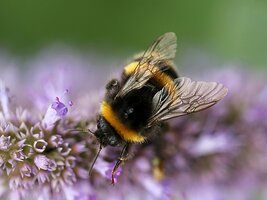~ecology-news-biolog | Bookmarks (424)
-
When life re-emerges after fires: How Mediterranean vegetation regenerates after burning
Fire is an element that has always been present in Mediterranean ecosystems. Thus, once the direct...
-
Bumble bee queens illustrate the complex effects of pesticide exposure on pollinator health
The effects of pesticide exposure on pollinator health may be more complicated than originally thought, according...
-
Mutualistic interaction between caterpillars and ants is highly specific, study shows
Some families of caterpillars (larvae of butterflies and moths) have developed a specific kind of interaction...
-
Male mosquitofish that perform better at problem-solving have a higher chance of mating, research shows
The Beatles said it best: Love is all you need. And according to new research from...
-
Who gets the lion's share? Ecologists highlight disparities in global biodiversity conservation funding
The extensive loss of biodiversity represents one of the major crises of our time, threatening not...
-
Indian street dogs show strong preference for yellow bowls, even empty ones
A team of animal behaviorists at the Indian Institute of Science Education & Research in India...
-
Interspecies alliances: Research examines cognitive underpinnings of cross-species collaborations
Some animals are capable of cooperating with members of other species. An interdisciplinary team involving the...
-
Beehive sensors offer hope in saving honeybee colonies
A UC Riverside computer science team has developed a sensor-based technology that could revolutionize commercial beekeeping...
-
Honeybee dance 'styles' sway food foraging success, study reveals
As far as animals go, honeybees are world-class dancers. While not as deep and complex as...
-
Life in the fast, or slow, lane: How environmental variability influences birds' survival and reproduction strategies
Birds worldwide make strategic decisions about how they live based on their environmental conditions. Some live...
-
How young salmon navigate a gauntlet of danger en route to the sea
For young salmon, the journey along the San Joaquin River in Central California is no small...
-
Backyard poultry at risk of bird flu when migrating mallards stop to rest
Knowing where, when and for how long mallard ducks—natural carriers of avian influenza—stop and rest as...
-
Desert rat-kangaroo's diet offers clues to its possible survival in remote Australia
An intriguing native Australian rat-kangaroo, thought to be probably extinct, may still be running around in...
-
Unraveling the mystery of rarely seen blue whale calves
Only two blue whale births have ever been recorded in human history, both decades ago. This...
-
Cuttlefish adjust their shape and color to suit conditions when seeking prey, study shows
A small team of marine biologists at the University of Bristol, in the U.K., working with...
-
'Devil'-like flower with 'horns' found in Texas is new species: Its location is secret
In a rugged stretch of desert in one of the nation's most remote national parks, a...
-
Virtual markers enable highly accurate multi-animal pose tracking in crowded environments
Studying the social behavior of animals in their natural environments is necessary for advancing our understanding...
-
Rare rearing: Japanese collaboration to save near-extinct White-bellied herons in Bhutan takes wings
The White-bellied Heron (WBH), the world's second-largest heron, is a symbolic bird for the people of...
-
'Dumb birds' no more: Emus and rheas are technical innovators, say researchers
Large birds—our closest relations to dinosaurs—are capable of technical innovation, by solving a physical task to...
-
Research shows turtles change nesting patterns in response to climate change
New research shows that turtles are responding to climate change by nesting earlier. Researchers monitoring nesting...
-
10 new sponge species discovered in Hawaii's Kāne'ohe Bay
In a succession of studies published this week and last month in the journals PeerJ and...
-
Fossil study reveals that palm trees once thrived in subarctic Canada
A new study by Connecticut College provides strong evidence that palm trees once thrived in subarctic...
-
Proactively exposing ecosystems to mild environmental stressors offers protection, study finds
Mild, proactive exposure to environmental stress can help biological communities resist severe disturbances and maintain genetic...
-
We can farm more seafood while minimizing its impact on biodiversity, research shows
Humanity can farm more food from the seas to help feed the planet while shrinking mariculture's...























